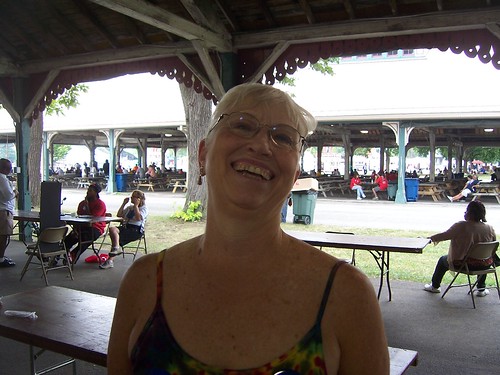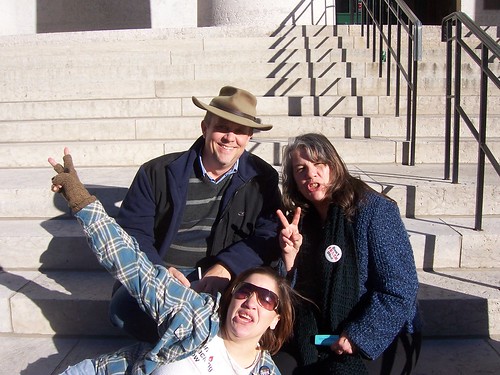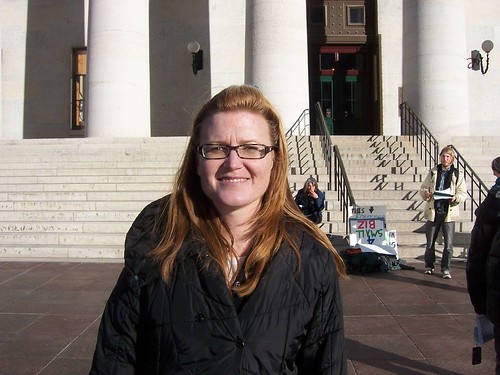Audio by title fracking
Pat Marida of the Ohio Sierra Club is part of the fight to stop hydraulic fracturing or 'fracking'.
7:30 minutes (6.87 MB)
“They’ve been using hydraulic fracturing for obtaining natural gas for years. However, this new process is much deeper. It’s going down more than a mile. It’s going down into shale bedrock, well below the water table. They’re actually putting in much water down below our fresh water. They’re adding some of 596 chemicals we’ve found they are using.”
Marida said natural gas companies are exempt from the Clean Water Act, as well as the . Clean Air Act and the Safe Drinking Water Act. But added to those environmental issues are labor issues.
‘These natural gas companies, they’re not hiring union members. They’re hiring non-union truckers. Many trucks are used in this process to haul the water, the drilling rigs, and then haul away the toxic water. What once was fresh water is now toxic They’re able to extract about half of it from the ground. The rest is left in the ground.. The people who know about this process know that they gas companies are lying about the safety of it.”
Marida said if people are interested in getting involved, they can email Matt Trokan. His email address is matt.trokan@sierraclub.org
The pavilion at the Ohio State Fair Grounds reminded me of a small bizarre where various organizations had their booths and tables. Marida said there is a common cause that could ally the groups.
“It’s the takeover of America by large monetary interests, corporate interests. We think it’s the takeover also by a few greedy political interests that are working in concert w/ multinational corporations. They want to pollute. They don’t want to hire union people and they don’t want the democratic process to work.”
- Login to post comments
- Read more
- Download audio file
Connie Harris on fracking
2:50 minutes (2.6 MB)
Connie Harris has been involved with activism in Columbus for many years. Presently working with Occupy Mansfield, she came to the State Capital on Jan 10 to protest for a moratorium on fracking.
“We had a great turnout. If people keep pushing hard enough, maybe they (politicians) will listen. In Mansfield, the Occupy group was able to work with the city government, Republicans and Democrats. They’re building a so-called war chest to build a fund to keep fighting for laws for better oversight (of fracking).”
Harris said the moratorium would allow time for properly assessing the risks and possible benefits of fracking.
“ A lot of these communities, they’re losing all their factory work and other jobs. They’re treating some of these communities like wastelands. People have to live there and work and send their children to school. This is some real dangerous stuff. They (government officials and industry) don’t know enough about it. We don’t know enough about it.
She said her recent involvement with fracking ties into other activism she has done over the years. The common theme is that politicians are not in tune with the will of the people.
“Government agencies are doing what they want to do. They’re definitely more interested in mulah than the safety of our communities. I just happen to be living in a town where they want to build two (fracking) wells. They want to give the underground an enema.”
- Login to post comments
- Download audio file
Cheryl Johncox on fracking -part 2
- Login to post comments
- Download audio file
Cheryl Johncox on fracking --part 1
3:59 minutes (3.65 MB)
Cheryl Johncox said calling for a moratorium on hydraulic fracturing is not being a perfectionist about the environment at the expense of society’s need for sources of energy. She said she and fellow activists with Buckeye Forest Council simply want better regulations.
“I can’t believe they can put a pit with radioactive fluid a hundred feet from my house and not even have to fence it in.”
Johncox said that as of 2010, Ohio no longer requires companies engaged in fracking to keep radioactivity logs. She said fracking fluids from Marcellus shale and Utica shale contain radioactive particles at a thousand times the recommended limit.
- Login to post comments
- Download audio file



